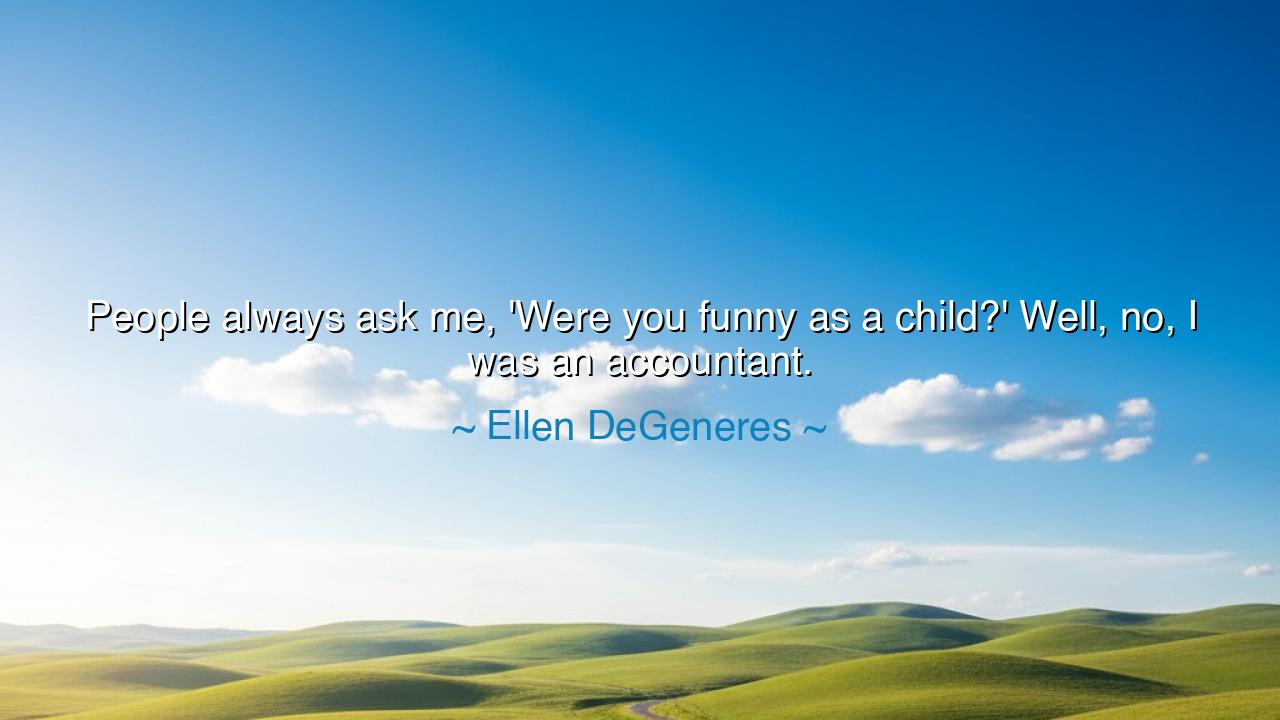
People always ask me, 'Were you funny as a child?' Well, no, I






“People always ask me, ‘Were you funny as a child?’ Well, no, I was an accountant.” — Ellen DeGeneres
At first hearing, this quip from Ellen DeGeneres, the celebrated comedian and storyteller, seems like a simple joke — a playful twist linking the seriousness of accounting with the levity of comedy. Yet beneath its laughter lies a deeper reflection on identity, transformation, and the nature of purpose. Ellen, with her characteristic grace and wit, reminds us that who we are at one time in life is not necessarily who we are destined to become. What begins as a jest about childhood and profession unfolds into a teaching about self-discovery — that the human spirit, even when shaped by the ordinary, may yet rise into the extraordinary.
The origin of this quote comes from DeGeneres’s early stand-up routines, where she often used humor to explore her own journey — from quiet, uncertain beginnings to a career built on laughter and courage. She once worked ordinary jobs before she became one of the most recognizable voices in entertainment. The joke about being an “accountant” becomes symbolic: not of literal bookkeeping, but of the rigid expectations and self-definitions that people often impose on themselves. To say she “was an accountant” as a child is to mock the absurdity of trying to define ourselves too early, of believing we must always know our path before we’ve even begun to live it.
In this way, the humor conceals a timeless truth, one known even to the ancients — that the soul evolves. A child may not appear gifted in laughter or art or leadership, yet within that same child may sleep the seed of greatness waiting for its season to awaken. The philosopher Heraclitus said, “No man ever steps in the same river twice,” for both the man and the river are changed. Ellen’s jest speaks to that same wisdom: who we are at one stage of life does not define who we may yet become. The self is a flowing river — sometimes quiet, sometimes fierce, always moving toward a wider sea.
There is also, hidden in her joke, a gentle challenge to society’s obsession with early talent and fixed identity. People often ask, “Were you always this way?” as though greatness must be visible from birth, as though the spark of genius or joy must announce itself loudly from childhood. But Ellen’s humor pushes back — she says, in essence, that becoming “funny,” or becoming oneself, takes time, courage, and growth. The laughter she creates is the fruit of years of observation, hardship, and resilience. By claiming she “was an accountant,” she mocks the idea that a person must always be extraordinary, reminding us instead that the extraordinary often emerges from the ordinary.
History offers many examples of such transformations. Consider Leonardo da Vinci, born the illegitimate son of a notary, apprenticed to a craftsman, not hailed as a genius from birth. Or Abraham Lincoln, who failed in business, lost elections, and endured ridicule before finding his voice as one of history’s greatest leaders. Both, like Ellen, remind us that destiny is not written in childhood temperament or early occupation, but in the courage to evolve. The “accountant” phase of life — the time of duty, restraint, and calculation — may precede the awakening of art, humor, or wisdom. It is the balance sheet before the poem.
Ellen’s line also reveals another layer of truth — the power of humor as transformation. The accountant, in her joke, represents logic, order, and seriousness; the comedian represents chaos, creativity, and freedom. In life, both are necessary, yet it is the courage to move from one to the other — from structure to spontaneity — that defines a fulfilled existence. The ancients might have said that such a person “unites Apollo and Dionysus,” the gods of reason and ecstasy. Through laughter, Ellen reconciles them both, showing that even from a life once measured in ledgers, one can learn to measure joy instead.
Thus, her jest becomes a parable for the modern soul: you are not confined by your beginnings. Whether your early life was dull or dazzling, your true calling may yet lie ahead. Be patient with yourself. Be curious. Do not let the labels of others — or the limits of yesterday — define your tomorrow. If you once lived as an “accountant,” so be it; even the accountant may one day become the artist, the teacher, the storyteller. What matters is not what you were, but what you are becoming.
So, my child, take this teaching from Ellen DeGeneres: do not mistake your current chapter for the whole book. Laugh at your past — honor it, but do not be trapped by it. The humor of life is that its roles are never fixed; the solemn may become joyful, the timid may become bold, the quiet may one day make the world laugh. For wisdom itself is born of the union of seriousness and play. In this way, even the “accountant” within you serves a sacred purpose — to remind you where you began, and how far you’ve yet to grow.
And when someone asks you, “Were you always this way?” — smile, as Ellen did, and answer not with apology, but with humor. For to laugh at one’s own transformation is the mark not of the fool, but of the wise.






AAdministratorAdministrator
Welcome, honored guests. Please leave a comment, we will respond soon